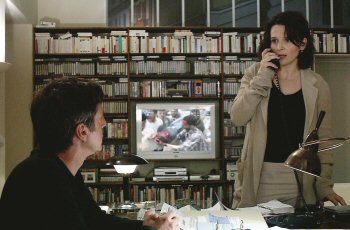January 14, 2006
Hidden/Cache’–WITH SPOILERS
 The house was packed for a 4:20 Friday matinee of Cache’, I was shocked. I was expecting to have the theater to myself. And I saw several people I knew. Boston is such a small town. Or rather, it’s such a small film town. Every time I go to an event that is interesting mostly just to film geeks, I see several people I know. There were many I didn’t know though, some of which I wanted to strangle for not turning their cell phones off EVEN AFTER THEY WERE RINGING or for saying stupid things to the screen like “Oh my God what a psycho. Why would he do something like that?”
The house was packed for a 4:20 Friday matinee of Cache’, I was shocked. I was expecting to have the theater to myself. And I saw several people I knew. Boston is such a small town. Or rather, it’s such a small film town. Every time I go to an event that is interesting mostly just to film geeks, I see several people I know. There were many I didn’t know though, some of which I wanted to strangle for not turning their cell phones off EVEN AFTER THEY WERE RINGING or for saying stupid things to the screen like “Oh my God what a psycho. Why would he do something like that?”
Despite this, I relished Cache’. Several critics are complaining about the film’s heavy-handed allegorical aspects–a heavy dose of self-satisfying white guilt over ‘the Algerian situation’ in France and the broader issues of Imperialism, the Iraq war and other Arab countries. (The image above is considered the most egregious example–for a very extended take, the couple stands on either side of the frame worrying about their son, who hasn’t come home from swimming practice yet, oblivious to the large TV screen in between them which blares with bloody images and news of deaths and violence in the Arab world.) And while these complaints are valid, I think (or perhaps I prefer to think) that despite this specific allegory, Haneke is always aiming for something more universal than that. I think that in part explains the uncertainty that surrounds the events of the story, to the very end. If he were merely commenting on France’s treatment of Algerians, would he leave it unspoken whether the two Algerians involved were actually involved? In keeping this uncertainty he steps back a bit from specific political arguments and instead makes the film about what all his films are about, basically: destabilizing (or perhaps more appropriately, terrorizing) comfy upper-middle-class intellectual families forcing them to confront The World Out There. In Time of the Wolf he used unspecified apocalyptic disaster, here it is racial tension and Imperialism. Perhaps it says more about me than about the films that I do very much enjoy watching Haneke knock the intellectual upper-crust families off their pedestals.
At any rate, heavy-handed political allegory or no, I was still enthralled by the stunning (DV) cinematography, acting, and skillful sense of dread and uncertainty that is woven into this and every Haneke film. But mostly, I just get lost in his images. His long takes. His decidedly unromantic and spare use of violence that makes it so much more shocking, and somehow so much more ethical, than most cartoonish movie violence that ultimately shields us from its impact. His movies really need to be seen on the big screen, too much is lost on a television screen. You need to immerse yourself in his images, accustom yourself to their rhythm.
I do agree with the critics, though, that this is not Haneke’s greatest film–I reserve that title for Time of the Wolf–but it is a very good film, and very much a Haneke film. But one might also call it a Bergman film, or a Tarkovsky film, or a Kiarostami film.
 Filed by cynthia rockwell at 2:33 pm under Just Movies
Filed by cynthia rockwell at 2:33 pm under Just Movies
Comments Off on Hidden/Cache’–WITH SPOILERS